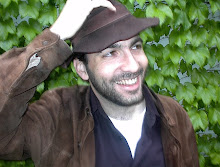Apparently, when I don't concentrate enough while I write, I ramble. Long sentences with lots of clauses that the reader needs to double back to read and understand. . . Honestly, I can't decide whether I'm happy or sad about this. I think Emerson said that people write they way they think and, you know, sometimes, maybe, we should take pride in being complex and difficult with our thought process. It's a complex and difficult place and challenges are fun. I'll write some rambley sentences; you do some work for a change.
In the corner of the world that is the theater community, I often overhear a debate about the role of the director v. the role of the playwright, text-based theater v. physical theater, collaboratively-created work v. playwright-driven work. . . I admit that I'd ignore these arguments if I wasn't a playwright. It's always seemed to me that all good theater is all of these things together and bad theater of a variety of kinds comes from separating words from physicality or collaboration from scripts.
However, I'm a playwright, and I think that the framing of these debates has gotten in to people's heads in a way that is detrimental to what I want to do in theater. Some people think they can't work with a playwright because playwrights don't collaborate in the rehearsal room like other theater people. Some people think that "physical" theater is preferably to working with a playwright -- as though all theater wasn't physical? Some people think the director must have the final say over the words and actions in the play.
I don't just disagree with these arguments -- Most playwrights I know, by the way, are happy to change a line in the script if there is a better line. It's just the height of nonsense to believe that the "impulse" an actor or director has one day is going to be hugely better than the lines a real writer actually crafted over the course of some months. I'm not against the possibility; I just think that most actors and directors have too little understanding of what the music of language can do and too much faith in the idea that because they speak in words, they have as much credibility with words as a person whose practiced in words. I know how to run but I don't say that I'm a runner.
But my point is that the entire argument misses the mark. When we debate about the "type" of theater we should be creating and how, I think we're really debating about who we TRUST to have the POWER in the rehearsal room. Listen -- Everyone contributes in theater. Everyone's contribution is equally important. Do we even have to debate it? However, someone creates the universe in which the play exists and, at some point, the person who creates the universe will need to say a few times -- "No, that doesn't fit." It's essential for success since the universe needs to be consistent to be effective.
Who is the person who gets to decide? A writer, by definition, creates worlds from nothing. You can't really redefine it. You can find excellent writers who will come in and craft what you've done in a rehearsal room or give ideas about how to unify some actions, etc., but then they aren't really writers -- They're dramaturgs or editors. A writer, when he or she is being a writer, creates universes. Period. If you trust the writer, if you like the writer, then there will be moments when you have to subvert your great idea to the writer's vision. And you will spend a lot of time thinking about the writer's vision.
You will have vision of your own (if you're a director, actor, or designer), you will have great idea's of your own, but we will all serve one vision. No that the writer is serving some vision that come to him or her in the middle of the night anyone -- not some ego trip (we hope).
The truth is that we all serve some unifying vision in order to get a play in front of an audience. Whose vision do we trust? Some directors don't really trust most writers. So they want to create work themselves or they want power over changes to the script. But, I just trying to say, the issue isn't about process ("We should create work with this method! No, we should use that method! This will make better work. No, this will make better!"), the issue is about power and trust.
Writers, maybe because they do so much work alone, often are strange creatures to everyone else in theater. So the idea of following their vision -- unless they're dead and highly praised by English teachers -- seems somewhat odd to many theater people. It's like trusting the cousin you never met with your life savings.
It's a fair worry.
Nonetheless, I'm just saying, writers by definition create a vision. You can't really get around it. And, also, theater, by definition, can't be created without trust.
Rather than argue about theater styles, methods, and types - since good theater incorporates so much -- I think. . . well. . . I guess I think. . . We all need group therapy. Trust exercises. O jeez. I've got to come up with something better than that.
At least, we should see what we're really arguing you about. "I don't want to give up my power! I don't trust you! I don't like you!" that kind of stuff.
Subscribe to:
Post Comments (Atom)

No comments:
Post a Comment